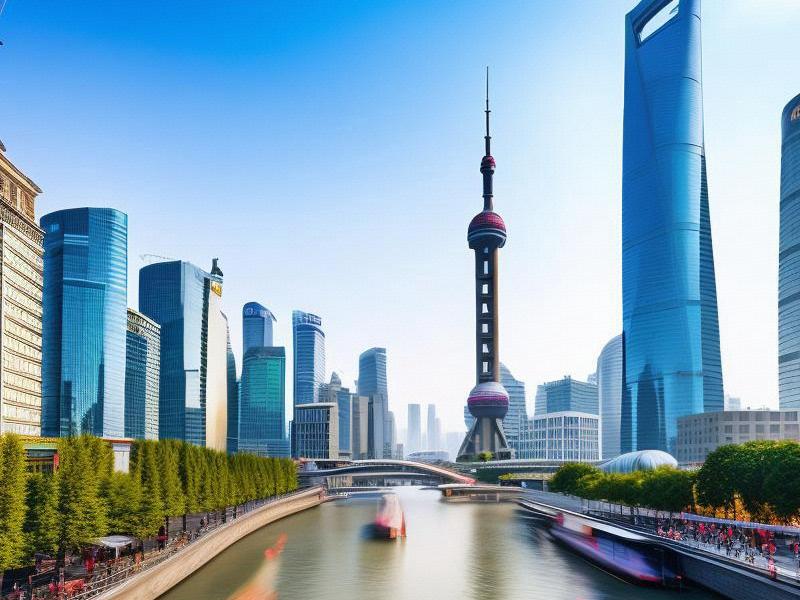This article delves into the vibrant and dynamic city of Shanghai, exploring its rapid urban development, cultural diversity, and status as a global economic hub. It aims to provide readers with an in-depth understanding of what makes Shanghai a unique and influential city in today's world.

Shanghai, often referred to as the "Pearl of the Orient," stands as a beacon of modernity and progress in China. This bustling metropolis, located on the eastern coast of China, is not only the largest city in the country but also a significant player on the global stage. In this article, we will explore the multifaceted aspects of Shanghai, including its urban development, cultural fusion, and economic prowess.
Urban Development in Shanghai
Shanghai's urban landscape is a testament to its rapid transformation over the past few decades. Once a small fishing village, the city has evolved into a sprawling metropolis with towering skyscrapers, modern infrastructure, and efficient public transportation systems. The iconic skyline of Shanghai, dominated by landmarks such as the Oriental Pearl Tower, the Jin Mao Tower, and the Shanghai Tower, is a visual representation of the city's economic growth and architectural innovation.
The Bund, a historic waterfront area, showcases the juxtaposition of old and new in Shanghai. On one side of the Huangpu River lies the historic Bund, with its colonial-era buildings, while on the other side, the Pudong New Area boasts futuristic skyscrapers and modern financial districts. This contrast highlights Shanghai's ability to blend its rich history with cutting-edge urban development.
Shanghai's urban planning is also notable for its emphasis on sustainability and green spaces. The city has implemented various initiatives to reduce pollution, promote renewable energy, and crteeaeco-friendly public spaces. For instance, the Shanghai Greenway Network, a series of interconnected parks and green spaces, provides residents and visitors with opportunities to enjoy nature amidst the urban sprawl.
Cultural Fusion in Shanghai
爱上海419论坛
Shanghai's cultural identity is a rich tapestry woven from diverse influences. As a former foreign concession, the city has absorbed elements of various cultures, resulting in a unique blend of traditional Chinese culture and Western influences. This cultural fusion is evident in the city's architecture, cuisine, art, and lifestyle.
The French Concession, for example, is a neighborhood that retains much of its colonial-era charm. With its tree-lined streets, charming cafes, and boutique shops, it offers a glimpse into the city's past. Similarly, the Shanghai Old Town, or Yuyuan Bazaar, is a preserved area that showcases traditional Chinese architecture, shops, and food stalls.
Shanghai's culinary scene is another reflection of its cultural diversity. The city is renowned for its "Shanghai cuisine," which features delicate flavors, fresh ingredients, and unique cooking techniques. However, the city's food scene also includes a wide array of international cuisines, from Italian pasta to Japanese sushi, reflecting the diverse population and global influences.
Art and culture thrive in Shanghai, with numerous museums, galleries, theaters, and music venues. The Shanghai Museum, housed in a stunning classical Chinese building, houses an extensive collection of ancient Chinese art, including ceramics, calligraphy, and paintings. The city's contemporary art scene is equally vibrant, with galleries like the Power Station of Art showcasing innovative works by both local and international artists.
Economic Hub of Shanghai
上海龙凤419体验
Shanghai's economic significance cannot be overstated. As one of the world's largest and most dynamic cities, it serves as a major financial center, trade hub, and innovation powerhouse. The city's strategic location along the Yangtze River Delta and its well-developed infrastructure make it a key player in China's economic development.
The Shanghai Stock Exchange (SSE) is one of the largest stock exchanges in Asia, attracting investors from around the world. The city is also home to the Shanghai Free-Trade Zone, a state-level economic zone that promotes trade and investment liberalization. This has positioned Shanghai as a gateway for international businesses seeking to enter the Chinese market.
Shanghai's manufacturing sector is another cornerstone of its economy, with a focus on high-tech industries such as information technology, biotechnology, and advanced manufacturing. The city's innovation ecosystem, supported by institutions like the Zhangjiang Hi-Tech Park and the ShanghaiTech University, fosters research and development, entrepreneurship, and collaboration between academia and industry.
Tourism also plays a significant role in Shanghai's economy. Each year, millions of tourists visit the city to experience its unique blend of history, culture, and modernity. Attractions such as the Yu Garden, the Nanjing Road shopping street, and the Shanghai Disneyland attract visitors from all over the world, contributing to the city's vibrant tourism industry.
Challenges and Future Prospects
上海品茶网
Despite its many achievements, Shanghai faces several challenges that it must address to sustain its growth and development. One of the primary challenges is managing the environmental impact of rapid urbanization. The city has taken steps to improve air quality, reduce traffic congestion, and promote sustainable practices, but continued efforts are needed to ensure a greener future.
Another challenge is addressing social inequalities and ensuring inclusive development. As a global metropolis, Shanghai attracts people from diverse backgrounds, creating a melting pot of cultures and ideas. However, this diversity also brings challenges related to housing, education, and healthcare. The city government is working to implement policies that promote social equity and improve the quality of life for all residents.
Looking ahead, Shanghai's future prospects are promising. The city is poised to play a leading role in China's ongoing economic transformation and its integration into the global economy. With its strong foundation in finance, trade, innovation, and culture, Shanghai is well-positioned to continue its rise as a global city.
In conclusion, Shanghai today is a dynamic and multifaceted city that exemplifies the spirit of modernization and progress. Its rapid urban development, cultural fusion, and economic prowess make it a unique and influential city on the global stage. While challenges remain, Shanghai's commitment to sustainability, inclusivity, and innovation ensures a bright future for this remarkable metropolis.